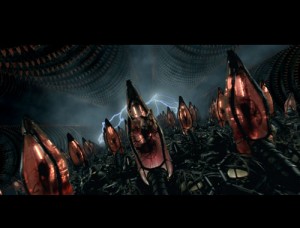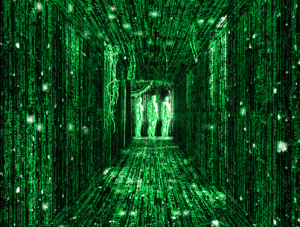“Nothing has changed”: The Matrix, Revolution, and The Hunger Games
Posted by on Thursday, April 12th, 2012 at 9:38 amHow revolutionary is the revolution in The Matrix? It would seem not very. According to the end of the film, Neo intends to reenter the matrix, teaching the people there to break free of the rules and boundaries of the world in which they live. However, the possibility of completely freeing everyone from the matrix and of taking down the big bad AI seems to be impossible. Well, let me rephrase that. It is not impossible. However, it would most likely result in the deaths of millions of people. In fact, Morpheus himself alludes to this fact when he apologizes to Neo for pulling him from the Matrix, stating that he has a rule wherein he normally does not release people over a certain age from the matrix since it gives too great a shock to their system. Since we can assume that Neo is in his late twenties, perhaps early thirties in this film, the age limit on who can be saved seems to be relatively low. If he directly attacked the matrix, he would risk killing millions. So, which is better—leaving people in the matrix, living false, but probably relatively contented lives, or releasing them into a cold, harsh world with no sunlight and most likely not enough resources to support them? The Matrix, while alluding to the presence of a reality, does not really make that reality a viable option for the majority of humanity. If they are freed, people will just be substituting one “prison” for another. This “revolution” seems to be doomed from the start.

Another key element working against the success of this “revolution” is the fact that Neo’s ability to fight the matrix and the AI is linked inextricably to the matrix. After making his threat against the AI and causing a mysterious system failure, he flies off into the sky. He does not return to the ship to begin the fight against the machines on the outside. Rather, he seems to choose the fight from within. One gets the sense at the end of the film that perhaps instead of demolishing the matrix, which I have already proven to be quite problematic, Neo is fighting to take down the AI (the dictator) in order to replace it with a new, supposedly better form of leadership—one which will allow people to exist in “a world without rules and controls, without borders or boundaries. A world where anything is possible” (The Matrix). The promise of getting people backto the real is undermined by the impossibility of this task from the start. So, Neo turns to plan B, which seems to be just another story about revolution that simply manages to replace one evil with a slightly lesser evil. People may be able to move freely in the matrix, but they will still be trapped there, separated from the real.
This aspect of The Matrix brought to mind the third book of The Hunger Games Trilogy. **SUPER MAJOR SPOILER ALERT** After becoming the face of the revolution against the domineering Capitol—in much the same way that Neo is supposedly the face of the revolution against the matrix—Katniss begins to question the ultimate outcome of the cause. President Coin suggests a final Hunger Games (games involving children between the ages of 12 and 18 chosen from each district—one boy, one girl—to fight to the death initially created to discourage dissent and rebellion amongst the 12 districts). However, this time, Coin wants to draw from a pool of the children of major politicians of the Capitol (children that were always immune from participation prior to the rebellion). The revolution was meant to stop the horrors of the Hunger Games. Overthrowing President Snow and replacing him with President Coin was supposed to stop the treachery happening within the Capitol. It is at this moment that Katniss asks herself “Was it like this then? Seventy-five years ago? Did a group of people sit around and cast their votes on initiating the Hunger Games?” (370). She suddenly realizes that “All those people I loved, dead, and we are discussing the next Hunger Games in an attempt to avoid wasting life. Nothing has changed. Nothing will ever change now” (370).

For those of us who have only watched the first film, we cannot know whether or not a similar fate will befall Neo. Will he suddenly realize the futility of destroying the matrix? Perhaps he has already since we see him plugging back in and flying away at the end of the film. Even if he manages to enact a change of power within the matrix, usurping the AI, will he ultimately have to say to himself, “Nothing has changed,” because the matrix still exists? In either possible ending, the majority of people will still be trapped in the symbolic and unable to access the “real”—making this revolution seem not very revolutionary.
Works Cited:
Collins, Suzanne. Mockingjay. New York: Scholastic, 2010. Print.
The Matrix. Produced, Directed, and Written by Andy Wachowski and Larry Wachowski. Perf.
Keanu Reeves, Laurence Fishburne, and Carrie-Anne Moss. Warner Home Video, 1999.
DVD.
You can follow any responses to this entry through the RSS 2.0 You can leave a response, or trackback.



I might be speaking ahead of turn, as we are reading Blake’s ‘Urizen’ for next week (and I haven’t yet!), but I can definitely see a parallel between President Snow/President Coin and the Orc/Urizen cycle that we touched on briefly when we discussed ‘Marriage of Heaven and Hell.’ Human revolution is a never-ending cycle – the rebellion in ‘The Hunger Games’ trilogy definitely shows this in the scenario you outline. The rebellion of the Districts initially prompted the institution of the Games (as a measure of control), then when the Rebellion overthrows the Capitol, President Coin doesn’t propose an end to the cycle, she instead wants to inflict the Games on the Capitol (as a measure of control).
*MAJOR SPOILER ALERT*
Katniss’ shocking assassination of Coin does seem to break this cycle (but, I’m open to debate here). Collins doesn’t give us a whole lot about what sort of government is actually formed out of the ruins of the rebellion, though there are hints of a Republic. I think Collins sets Katniss up as the perfect cocktail of effective revolution: she is severely lower-class (single-parent home, perpetually in danger of starvation), she experiences the Games (which instills in her a small, but vital, degree of empathy which manifests itself in her vehement objection to Coin’s final Games idea), and a sudden accruing of power (her reluctant role as the symbol of the Rebellion). In short, Katniss is Collins’ version of Godwin’s “preceptor.”
I definitely agree with what you are saying! Katniss has grown up away from the privileges of the Capitol. She is poor and struggling and unable to even envision excess. When she is presented with the extravagances of the Capitol, such as their affinity for stuffing themselves, throwing up, and then stuffing themselves again, she is disgusted. Also, we know that Katniss is a hunter. So, she is very tied to the process behind the food she eats, making her in Baudrillardian terms perhaps closer to the real. Unlike the Capitol where everything is automatic and nobody does anything it seems but eat and have fun, Katniss is closer to the “real” of her world. As a result, she is less caught up in the system. She does not adhere to the ideology of the Hunger Games like some of the other children that participate who laugh and joke about killing one another. She feels each death and rebels in small ways by placing flowers around Rue’s head and saving Peeta’s life instead of killing him like she is supposed to. Although she has been born into an ideology and the system of society–she has been less indoctrinated by it since she is the furthest away from the simulacrum of the Capitol. She has not fallen from the skies, but she is perhaps one of the most willful characters that has been the least affected by the Capitol. From the beginning she is defined by her separateness from the ideology of the Capitol, and she retains this to the end by killing President Coin, who represents a continuation of the cycle of the Capitol’s ideology in a different form. So, as you said, even though we do not get a clear sense of what things look like after Coin is dead and the rebellion is over, we can perhaps hold fast to the notion that something indeed has changed from the beginning of the books. The cycle has been broken, the ideology challenged, and things have changed. The ideology of the Capitol has been exchanged for another–whether this one is better or not, we can only guess.
I haven’t read the Hunger Games or seen the film, but I wonder if one ever can escape the Matrix. Let’s say Neo succeeds and defeats the AI, destroys the Matrix, and frees everyone. There is no more Matrix–so we are supposed to believe. The talk of installing a new dictator, someone to rule over all those freed from the Matrix, may well result in someone eventually ruling who is worse than the AI, the cycle repeated and nothing changed. However, even if the ruler were benevolent, does it matter? Isn’t it still another Matrix? We talked throughout our reading of Caleb Williams about the system created by society, prisons to convince us that society itself is not one, yet how we are unable to sustain an identity without a society. Is there ever a real to reach even outside of the virtual? It would seem like the answer is no, we can only hope for something a little better than what it was.
Pingback: The (Post)Humanist Matrix, Neuromancer, and Cyberpunk - Technoromanticism
I see the connections you are making between the two stories. However, while I would be fine taking the blue pill and staying in the Matrix, I would also like to think I would join the revolution against the Capitol. Though perhaps I wouldn’t be close enough to the power center as Katniss is, and would not realize that one system of oppression was about to be replaced with another. If a cycle of revolution never results in something better (or without corruption) then what can an individual do? Perhaps I am an idealist after all.
Pingback: hcg diet dangers dr. oz
Pingback: lustra
Pingback: lustro piotrków
Pingback: bity na sprzedaż